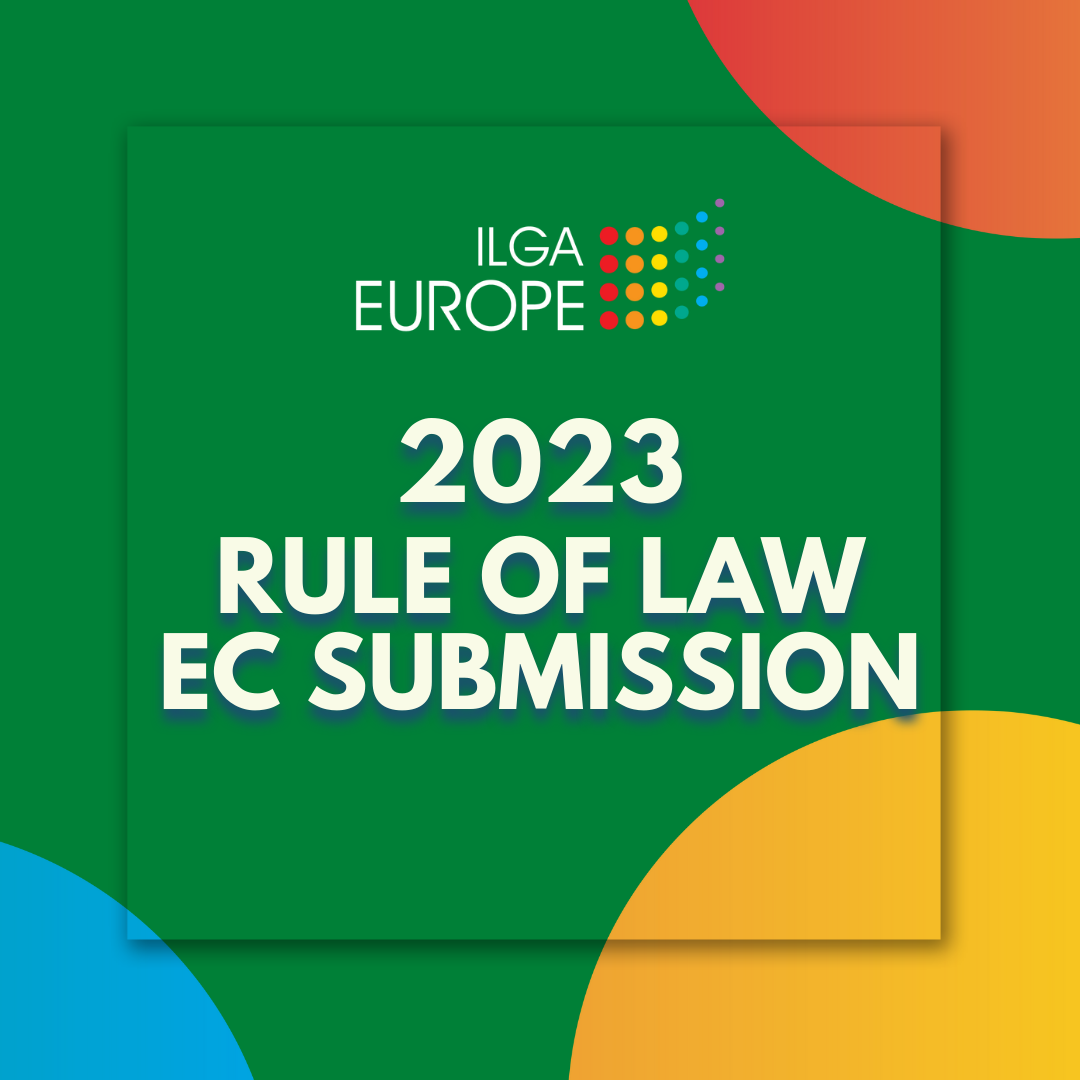Our submission to the EC 2023 Rule of Law report

The submission covers developments in eight EU Member States as regards rule of law developments in the countries which have had an impact on the fundamental rights of LGBTI people and their democratic participation, with a focus on the past year (2022).
We have kept our inputs relevant to the content asked for by the consultation, and therefore we have not included all fundamental rights violations against LGBTI people, or all restrictions experienced by LGBTI civil society in the respective countries. We have only included them where there is a clear link to the issues of rule of law contained in the consultation.
Notably the submission covers the following topics:
- Manipulation of judicial processes to attempt to erode the human rights of LGBTI people and their access to justice;
- Politicians attempting to discredit and delegitimise the rulings of courts that uphold the rights of LGBTI people;
- Harassment and intimidation of LGBTI human rights defenders by law enforcement/prosecution services;
- Smear campaigns and negative narratives against LGBTI people, particularly where independence of media is threatened;
- SLAPPs against activists or journalists reporting on topics of public interest related to LGBTI;
- Censorship of LGBTI content;
- Tabling and adoption of laws aiming to reduce fundamental rights of LGBTI people;
- Tabling of laws aimed at restricting the functioning of civil society organistions;
- Arbitrary application of Covid-19 regulations to attempt to restrict the freedom of assembly of LGBTI people;
- Continued non-implementation of CJEU or ECtHR judgements which would improve the lives of LGBTI people;
- Anti-LGBTI discriminatory speech from political and religious leaders affecting public perception of LGBTI CSOs and creating an unsafe climate for LGBTI human rights defenders;
- Insufficient implementation of legal protection (e.g. protection against hate crime) for LGBTI people by responsible services, sometimes including Ombudspersons.
Rainbow families have the right to move and reside freely, EU court reiterates

The Court of Justice of the EU has stated that birth certificates issued in an EU country must be recognised across the EU, and that EU countries should protect the freedom of movement of rainbow families.
On June 24, the Court of Justice of the European Union (CJEU) issued a reasoned order establishing that when an EU country has recognised two persons of the same sex as parents of a child, then the EU country of which that child is a national, should issue identity documents to that child with both parent on them, and all EU countries should protect the right to freedom of movement of the child and their family. This is a confirmation of a previous landmark judgment, that of Baby Sara.
Poland has been told that it must now provide the child known as Baby Sofia, born in 2018 to Irish and Polish mothers, with identity documents and guarantee her and her parents the right to move and reside freely in the country.
The case arose when Poland denied citizenship to baby Sofia, daughter of two mothers, Kashka, from Poland, and Sinéad, from Ireland. In 2018, Sofia was born in Spain, where the couple had gone to receive IVF treatment. Spanish authorities issued a birth certificate with the name of the two mothers but not identity documents, as children of foreigners are not automatically entitled to citizenship in the country.
At that time, in Ireland, two women could not be recognised as parents on a birth certificate. In the eyes of Irish law, the mother was the woman who gave birth to the child. As Kasha, the biological mother was not Irish, Sofia couldn’t apply for citizenship in Ireland either.
In Poland, where rainbow families are still not recognised, authorities refused to recognise Sofia’s birth certificate, depriving her of access to citizenship and identity documents. For over two years Sofia remained without any documentary proof of any nationality, and therefore at risk of statelessness. The family was could not leave Spain, as Baby Sofia couldn’t travel without documents. Her mothers had to move house every couple of months, as they were running out of savings.
Now, the CJEU has stated that an EU country is obliged to provide identity documents to a child when the child, being a national of the country, has a birth certificate issued in another member state that designates two persons of the same-sex as their parents. All EU countries must respect the documents that allow the child and their family to exercise their right to move and reside freely with the territory of the EU. These are protections granted in Articles 20 and 21 of the Treaty on the Functioning of the European Union (TFEU) and Articles 7 and 24 of the Charter of Fundamental Rights of the EU, among others.
With this reasoned order, the CJEU has confirmed the landmark judgment delivered in the Baby Sara case last year, which arose when a same-sex couple were refused a birth certificate in Bulgaria for their daughter, also born in Spain. Poland must now provide Baby Sofia with identity documents and guarantee her and her mothers the right to move and reside freely in the country.
In the meantime, Spain issued identity documents to Sofia in March 2019. Spanish law foresees a safeguard measure that allows children born in its territory who would otherwise be stateless to acquire Spanish nationality at birth. The couple also applied for Irish citizenship for Sofia through naturalisation over two years ago, but they have not received any feedback since March 2020. The Children and Families Relationship Act, which allowed both women in a same-sex couple to be automatically recognised on their child’s birth certificate, was enforced in Ireland in May 2020.
Welcoming the order, but concerned about its implementation, the lawyer for Baby Sofia’s parents, Anna Mazurczak said: “We are, of course, happy that the Court has applied the reasoning from the Bulgarian case in a Polish case. However, the Court has not been as straightforward as we had hoped. We wanted to make sure that Poland had the obligation not only to issue an ID but also to indicate the first names of same-sex parents on it.
“Through the CJEU’s reasoned order, we hoped to convince the Supreme Administrative Court of Poland that issuing an ID with one mother’s name is not enough. The CJEU has already held that different last names contained in documents issued by different member states can cause an obstacle to the right of freedom of movement. In my opinion, the different parent names on the ID card can violate freedom of movement even more.”
Recently, a draft amendment to the Family Code was submitted for public consultation in Poland, where marriage equality, same-sex registered partnerships and co-parent recognition are not recognised. While it could improve the situation of children of same-sex parents born abroad by recognising their birth certificates, it also presents a discriminatory approach towards rainbow families. There is no clear timeline for the development and implementation of these amendments.
According Arpi Avetisyan, Head of Litigation at ILGA-Europe: “The CJEU’s reasoned order is a welcome confirmation of the rights of children in rainbow families. The Polish and Bulgarian cases that have reached the CJEU, Baby Sofia and Baby Sara, are not isolated. They show the tip of the iceberg of the numerous examples of the hardships experienced by rainbow families in the EU.
“We hope that the upcoming European Commission’s legislation on parenthood recognition, by incorporating the CJEU rulings, will provide a framework for removing obstacles to freedom of movement for rainbow families. What is crucial at the present, however, is that Poland and Bulgaria put in place necessary procedures for implementing CJEU’s judgment and reasoned order as soon as possible.”
Meanwhile, in Bulgaria, the ruling in Baby Sara’s case has not yet been implemented. While on 16 May, Sofia’s Administrative Court, which had asked the CJEU for clarification in this case, ruled that Capital Municipality, Pancharevo District must issue a birth certificate with both of Sara’s mothers on it, the decision was appealed by the Municipality on 13 June. This means that to date, Sara is still without documents and at risk of statelessness.
Good practices: TENI

Thank you to TENI (Ireland) for sharing your good practices with us as part of the Come Out for Mental Health campaign!
“Our work on mental health has lots of different elements. When I think about TENI’s work with policymakers, it reminds me of the scaffolding you see when a house is being built. It’s not the finished product, but it is work that will provide a structure for future activities, work that is designed to have long-lasting positive effects.
All the ongoing training and conversations happening between TENI and policymakers, healthcare professionals or teachers might not be the most visible element of our work – but it does result in guidelines and increased understanding. It is positive that TENI have a good working relationship with the Health Service Executive (HSE – Ireland’s health service), School Managerial Boards, researchers and other key people and organisations that can facilitate the needs of the trans community. Tools like guidelines for general practitioners (GP’s) are what will make a huge difference to trans people, considering that trans people often experience anxiety when presenting at these services.
TENI are also very excited to be partnering with HSE to deliver Gender Identity Skills Training (GIST) which is due to begin soon. GIST will be evaluated, with the aim of offering this training to all healthcare providers in all regions of the Republic of Ireland.
TENI also provided training for staff in 47 post-primary schools and 17 primary schools in the the Republic of Ireland in 2016/2017 school year. In many ways, we are living in a different Ireland now… and that can only be a good thing for the mental health of trans people.”
– Vanessa Lacey, TENI Health & Education Manager, in conversation with Come Out for Mental Health